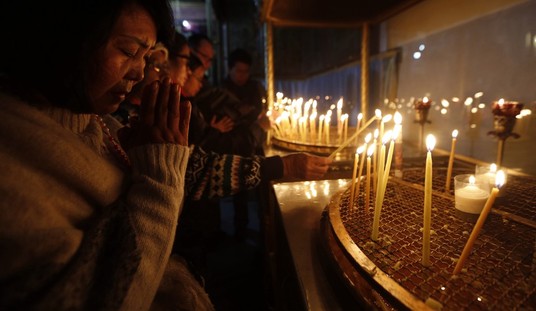
In this photo made available by the Emirates News Agency, WAM, Emirati people wave the national flag as a convoy of UAE military vehicles and personnel travels from Al Hamra Military Base to Zayed Military City, marking the return of the first batch of UAE Armed Forces military personnel from Yemen, United Arab Emirates, Saturday, Nov. 7, 2015. (Ryan Carter-Crown Prince Court – Abu Dhabi/WAM via AP)
Our Arab allies in the anti-ISIS air campaign are leaving President Obama alone again, naturally:
The Obama administration heralded the Arab air forces flying side by side with American fighter jets in the campaign’s early days as an important show of solidarity against the Islamic State, also known as ISIS or Daesh. Top commanders like Gen. Lloyd J. Austin III, who oversees operations in Syria and Iraq, still laud the Arab countries’ contributions to the fight. But as the United States enters a critical phase of the war in Syria, ordering Special Operations troops to support rebel forces and sending two dozen attack planes to Turkey, the air campaign has evolved into a largely American effort.
Administration officials had sought to avoid the appearance of another American-dominated war, even as most leaders in the Persian Gulf seem more preoccupied with supporting rebels fighting the government of President Bashar al-Assad of Syria. Now, some of those officials note with resignation, the Arab partners have quietly left the United States to run the bulk of the air war in Syria — not the first time Washington has found allies wanting.
That last line is a polite way for the New York Times to frame the situation — but is it accurate? Are our allies lacking, or are we? Maybe we can find the answer to that question in this report from StrategyPage on the fighting in Yemen:
While things are going well for Iran in Gaza, Lebanon, Syria and Iraq the pro-Iran Shia rebels of Yemen are facing defeat. This comes despite help from Iran and Lebanese Hezbollah smugglers and military advisors. The worst aspect of all this is that the foreign intervention was all Arab (Saudi Arabia, Kuwait, Qatar, the United Arab Emirates and Bahrain), using their modern Western weapons. The Arabs are succeeding, which does not bode well for Iran which has long (at least in the last few centuries) relied on its superior military capabilities to intimidate their Arab neighbors. What’s going on in Yemen is diminishing that threat quite a bit. It makes Yemen a particularly costly defeat for Iran.
The Sunni Arab nations are doing well against Yemen’s Iranian-backed rebels, but nobody seems to be doing very well in the US-led effort against ISIS.
It would appear then that the Arabs have found Washington wanting, and that in Yemen at least, they themselves are the strong horse.










Join the conversation as a VIP Member